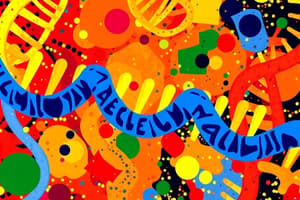Podcast
Questions and Answers
What is the correct mRNA codon that pairs with the tRNA anticodon 3' --C--A--U--5'?
What is the correct mRNA codon that pairs with the tRNA anticodon 3' --C--A--U--5'?
- 3' -AUG-5'
- 3' -UAC-5'
- 3' -GUA-5'
- 3' -CAU-5' (correct)
Which of the following mRNA codons can form a base pair with the tRNA anticodon 3' --G--G--C--5'?
Which of the following mRNA codons can form a base pair with the tRNA anticodon 3' --G--G--C--5'?
- 3' -AUG-5'
- 3' -G--C--G--5' (correct)
- 3' -C--C--G--5'
- 3' -C--G--C--5'
Which codon-anticodon pairing is incorrect based on the provided tRNA sequence?
Which codon-anticodon pairing is incorrect based on the provided tRNA sequence?
- 3' -UAC-5' (correct)
- 3' -AUG-5'
- 3' -CAU-5'
- 3' -GUA-5'
What would be the complement of the tRNA sequence listed as 3' --G--G--C--U--U--A--C--A--G--5'?
What would be the complement of the tRNA sequence listed as 3' --G--G--C--U--U--A--C--A--G--5'?
Identify the tRNA anticodon that corresponds to the mRNA codon 3' --UAC--5'.
Identify the tRNA anticodon that corresponds to the mRNA codon 3' --UAC--5'.
What distinguishes adenine from cytosine in terms of base pairing?
What distinguishes adenine from cytosine in terms of base pairing?
Which of the following nucleotides forms three hydrogen bonds with its complementary base?
Which of the following nucleotides forms three hydrogen bonds with its complementary base?
How can you determine if a white, fibrous substance is DNA or RNA?
How can you determine if a white, fibrous substance is DNA or RNA?
What is the role of helicase in DNA replication?
What is the role of helicase in DNA replication?
Which statement accurately describes eukaryotic DNA?
Which statement accurately describes eukaryotic DNA?
In nucleic acids, which sugar differentiates RNA from DNA?
In nucleic acids, which sugar differentiates RNA from DNA?
What determines the specificity of base pairing between nucleotides?
What determines the specificity of base pairing between nucleotides?
Which base pairs with adenine in DNA?
Which base pairs with adenine in DNA?
Flashcards
Anticodon
Anticodon
The sequence of three nucleotides on a tRNA molecule that recognizes and binds to a complementary codon on mRNA during translation.
Codon
Codon
The sequence of three nucleotides on an mRNA molecule that codes for a specific amino acid.
Translation
Translation
The process by which the genetic code in mRNA is translated into a sequence of amino acids in a polypeptide chain.
Codon-Anticodon Base Pairing
Codon-Anticodon Base Pairing
Signup and view all the flashcards
Start Codon
Start Codon
Signup and view all the flashcards
What are nucleic acids?
What are nucleic acids?
Signup and view all the flashcards
How can A distinguish T from C?
How can A distinguish T from C?
Signup and view all the flashcards
Distinguishing DNA, RNA, and protein
Distinguishing DNA, RNA, and protein
Signup and view all the flashcards
True Statement about Eukaryotic DNA
True Statement about Eukaryotic DNA
Signup and view all the flashcards
Which enzyme separates DNA strands?
Which enzyme separates DNA strands?
Signup and view all the flashcards
Hydrogen Bonding in DNA
Hydrogen Bonding in DNA
Signup and view all the flashcards
DNA Polymerase III Function
DNA Polymerase III Function
Signup and view all the flashcards
The Role of Helicase
The Role of Helicase
Signup and view all the flashcards
Study Notes
Nucleic Acids
- DNA and RNA are nucleic acids responsible for hereditary information, directing protein synthesis.
- Nucleic acids are composed of nucleotides.
- Nucleotides consist of a sugar (deoxyribose in DNA, ribose in RNA), a phosphate group, and a nitrogenous base.
- Nitrogenous bases in DNA: adenine, thymine, cytosine, and guanine.
- Nitrogenous bases in RNA: adenine, uracil, cytosine, and guanine.
Nucleotide Structure
- Phosphate group bonds nucleotides together, forming polynucleotide chains.
- 5' end: phosphate-ended extremity.
- 3' end: pentose-ended extremity.
- Important for biological functions as some reactions occur in a 5' to 3' direction.
DNA Structure
- DNA consists of two polynucleotide chains in an antiparallel configuration (5' to 3' and 3' to 5').
- Antiparallel configuration is crucial for replication.
- Hydrogen bonds bind bases of opposite strands (A with T; G with C).
DNA Replication
- The pairing of bases facilitates DNA replication.
- Each chain acts as a template for a new strand.
- Enzyme DNA polymerase is involved.
Replication Errors
- Errors during replication lead to mutations, impacting protein synthesis and biological evolution.
- Mutations can create new traits, resulting in species diversity.
Transcription vs Replication
- Both use DNA as a template.
- Replication makes a copy of the entire DNA molecule.
- Transcription produces RNA from a DNA segment.
- Different enzymes (DNA polymerase and RNA polymerase) are involved in each process
DNA Base Sequences
- Complementary base pairs guarantee accurate DNA replication and transcription.
- The sequence of nitrogenous bases is crucial for the specific function of DNA.
DNA Structure and Components
- DNA is a complex molecule with a double helix structure.
- The sequence of nucleotides determines the hereditary information.
Identifying DNA, RNA, or Protein
- Presence of amino acids identifies a protein.
- Presence of ribose/deoxyribose and uracil/thymine differentiate RNA/DNA.
Differences between A and T with C and G
- A and T form two hydrogen bonds.
- C and G form three hydrogen bonds.
- This difference in hydrogen bonding affects the stability of DNA structure.
mRNA and tRNA
- mRNA (messenger RNA) is transcribed from DNA.
- tRNA (transfer RNA) carries amino acids during protein synthesis.
- Anticodons on tRNA match with codons on mRNA for accurate protein synthesis.
DNA Polymerase
- DNA polymerase III is crucial for DNA replication. It can only add nucleotides to an existing chain.
- An RNA primer is required for DNA polymerase III's activity in DNA replication.
Studying That Suits You
Use AI to generate personalized quizzes and flashcards to suit your learning preferences.




